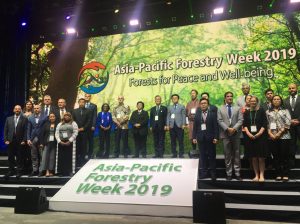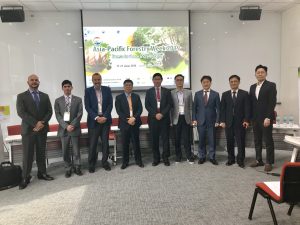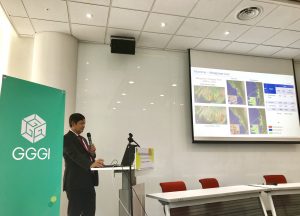 Incheon, Republic of Korea, June 17-21, 2019 – This week, GGGI is taking part in the Asia-Pacific Forestry Week (APFW), at the Songdo Convensia Convention Center in Incheon. APFW 2019, organized by the Food and Agriculture Organization of the United Nations (FAO) and the Korea Forest Service (KFS), is the largest and most important forestry gathering in the Asia-Pacific region in 2019. The event is attended by various stakeholders including leading scientists as well as key private sector actors. This event will serve as a strategic platform to raise awareness and discussion on overall peatland management in the Asia-Pacific region and address GGGI’s global efforts to build a resilient environment.
Incheon, Republic of Korea, June 17-21, 2019 – This week, GGGI is taking part in the Asia-Pacific Forestry Week (APFW), at the Songdo Convensia Convention Center in Incheon. APFW 2019, organized by the Food and Agriculture Organization of the United Nations (FAO) and the Korea Forest Service (KFS), is the largest and most important forestry gathering in the Asia-Pacific region in 2019. The event is attended by various stakeholders including leading scientists as well as key private sector actors. This event will serve as a strategic platform to raise awareness and discussion on overall peatland management in the Asia-Pacific region and address GGGI’s global efforts to build a resilient environment.
Sustainable Forest Business Talks
 On June 19, GGGI co-hosted the session titled “Sustainable Forest Business Talks” with the Korea Forest Service to create a dialogue on how to promote, replicate, and scale up private investment in forest business to ensure poverty reduction, local capacity building, and environmental sustainability.
On June 19, GGGI co-hosted the session titled “Sustainable Forest Business Talks” with the Korea Forest Service to create a dialogue on how to promote, replicate, and scale up private investment in forest business to ensure poverty reduction, local capacity building, and environmental sustainability.
Forests and mixed landscapes provide numerous ecosystem services upon which human society relies. However, the compounding effects of deforestation and landscape degradation remain pervasive across the developing world. The relevance of the agriculture, forestry, and land use sector in the national priorities is evident; many developing countries and most LDCs include the AFOLU sector in their NDCs under the mitigation, adaptation and cross-cutting categories.
There is a need for public-private partnerships and innovative sustainable forest business models that are scalable, replicable, environmentally friendly and socially inclusive. Innovative business models are required for plantation establishment,

sustainable management of natural forests, agroforestry, and agriculture under a landscapes approach. Growing market demand for timber and non-timber forest products worldwide represent an opportunity that smallholders, local communities, indigenous and other forest-dependent people often miss due to lack of technical, financial and market literacy. Producer companies, processing and manufacturing companies, consumers and financial institutions, can all play a role in mobilizing investments needed to mainstream sustainable land uses, bridging the current gap to boost sustainable forest resources management and landscape restoration.
During the session, participants shared perspectives about sustainable forest business models that incorporate innovative partnerships and operational arrangements, highlighted what makes a difference in forest business, and discussed how to facilitate forest business for the local community.
Innovation of Peatland Management under Changing Climate
The Ministry of Environment and Forestry (MoEF) of the Republic of Indonesia in collaboration with the Global Green Growth Institute (GGGI), the Forest for Life Indonesia (FFLI) and the Asia Forest Cooperation (AFOCO) will present a session titled “Innovation of Peatland Management under Changing Climate” on 21 June 2019 at 11:00-12:30, in conjunction with the 4th Asia-Pacific Forestry Week (APFW 2019) held in Songdo Convensia, Incheon, Republic of Korea.
Peatland has attracted global attention due to its significant contribution to global carbon balance. Although its overall surface area is relatively small, i.e. only 3% including forested peatlands, these peatlands have carbon stock more than the tropical forests. Disturbance on these lands due to human activities such as agricultural expansion and drainage construction, peat mining, combined with extreme climate manifestation has contributed to the degradation of about 65 million ha of peatland area globally. Emission resulted from these disturbances is very significance, reaching to about 3 Gt CO2 per year, or about 5% of the global carbon budget.
Peatlands also play an important role in economic development. Therefore, policies, strategies, and technologies for improvement of peatland management is crucial to enable achievements of global commitments to mitigate climate change, as outlined in the Paris Agreement. Many good practices have been implemented to manage the peatlands in sustainable ways. However, such practices have not been adopted widely as applying such practices also faces various challenges. Therefore, the Indonesia session aims at sharing innovative approaches for measuring, monitoring and reporting emission from forest and peatland, and at the same time, providing an update of research progress on the status of forest and peatland, and reinforcing their importance in global carbon cycle and to national economies.